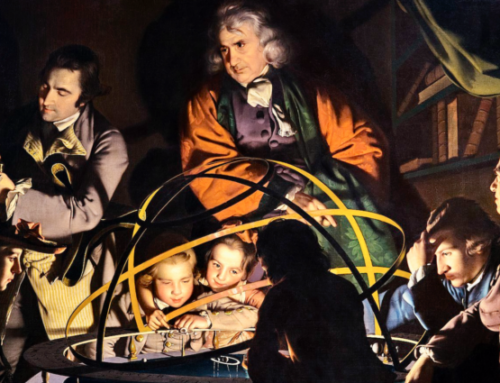We are in a civilizational crisis, one that is the outworking of anthropological mistakes that have long festered. Increasingly in the history of Western culture we have forgotten or ignored or misconstrued, not only mimesis, but what is perhaps the most essential fact of human existence, namely, religious longing.
Theologian Gil Bailie was a personal friend of French philosopher and critic, Rene Girard. Bailie is the author of Violence Unveiled, God’s Gamble and most recently, The Apocalypse of the Sovereign Self. Fr. Longenecker met Bailie recently and interviews him here for The Imaginative Conservative.
You were friends with Rene Girard. How did you meet?
In the mid-1980s I was teaching courses in a little institute I started in my small town in Northern California, which thereafter became the Cornerstone Forum. I had first come upon Girard when I found a book of his – Violence and the Sacred – on a sale table at the University of California bookstore. Having seen his name in footnotes, but not knowing if he was dead or alive, in France or this country, I bought the book and dipped into it as soon as I got home. It took me a long time to fully appreciate the complexities of Girard’s anthropological analysis, but it only took a few minutes for me to realize that what I had in my hands was transformational. Lo and behold, a few months later, the host of a biblical conference that was to take place in my small town, who knew of my interest in Girard, called to say that a group of the scholars had persuaded Girard to spend the day talking with them about the implications of his work for biblical studies. The conference host then said that he had no place to hold such a meeting and asked if it could be held in my office. I thought I had been struck by lightning.
So, I first met René when he came up from Stanford to spend a day in my office conversing with a dozen or so biblical scholars. It was a tour de force. I’ll repeat what I have shared many times over the years: After René gave an overview of his work, one of the scholars asked, with an air of intellectual confidence in what the answer would be: “From what you are saying, it almost seems as though you think that biblical literature is categorically superior to all other literature. But (you’re a Stanford professor) you’re not saying that are you?” René replied: “Categorically.” Instantly, I sensed both his genius and his intellectual courage.
What was Girard’s most memorable and influential personal trait?
Humility and tenacity, a rare combination. Always soft-spoken, he could be a fierce defender of his own work, even as he sought always to give kudos to those of his illustrious predecessors whose work he saw as presaging his own. Personally, he was a kind and gentle man. In the intellectual arena, he was a force not to be easily dismissed. Rather perhaps like St. Paul.
Was Girard a man of faith? How was that regarded by his colleagues in the academic world?
He most certainly was a man of faith. An anecdote I have often shared might help. As one who had little contact with the academic world, I was shocked to find how much resistance there was to Girard’s work. I strongly felt the power of his theory, so eventually I decided to try to write a book that would outflank the academic embargo and make Girardian theory accessible to the average reader. After I had been working on Violence Unveiled, my first book, René and I were having lunch at the Stanford Faculty Club, sitting at an outdoor table on a beautiful day. At one point, I said to René, to the best of my recollection: “René, I know that part of the resistance among your academic colleagues is their wariness concerning the role Christianity plays in your work. It turns out, however, that the book I am writing is going to be very Christian, even Catholic for those with an ear for such things. I may be just compounding the problem.” He leaned over the table as though to share a secret with a gleam in his eye and said: “Let’s burn our boats on the beach.”
Can you summarize Girard’s core concept—mimetic attraction?
Let me try to touch on that in terms that formed the backbone of my latest book. We are in a civilizational crisis, one that is the outworking of anthropological mistakes that have long festered. Increasingly in the history of Western culture we have forgotten or ignored or misconstrued, not only mimesis, but what is perhaps the most essential fact of human existence, namely, religious longing. This feature of the human condition is vastly more important than the opposable thumb or the discovery of fire. Our mimetic predisposition cannot be overlooked without catastrophic consequences, nor can its role in mankind’s religious life be discounted. The great question is: how is this religious acuity awakened and thereafter properly ordered? No small number of people have tried to dispense with it as the residue of an earlier stage of human affairs. It is only a matter of time, however, before that religious longing is transferred to ideologies that promise to relieve the boredom of not having a real religion, ideologies that exonerate the violence of their adherents. I tried to bring this out in my chapter on the poet Sylvia Plath. I quote a passage in Plath’s journals where she longs for God and for purpose in her life. In desperation, she toys with the possibility of committing herself completely to some political “cause” with a capital “C,” the violence of which could be justified as a “splurge of altruism.” Countless people today are doing exactly that.
There is one feature of this quintessential religious longing that must be recognized: it is always mediated. It is awakened by another or others. The entire biblical canon and the history of the Church provide the guidelines for properly channeling this religious longing, and it does so by showing us countless examples of sinners and saints whose lives and legends convey something about how our religious longing might properly be channeled and ordered.
What did Girard propose as a way forward in the contemporary crisis of culture?
In the seminar with modernist Bible scholars that I have already referenced, Girard’s views were received with some consternation. Clearly, the panorama Girard had spread out before those assembled was astonishing, and against this backdrop, René’s sobering assessment of the contemporary historical and cultural predicament stood out in bold relief. Given all that you have said, someone asked Girard, what is to be done? In response, René was gracious and patient and humble. His answer, as I recall, was something like this: “Well, it is of course an enormous problem, and it does not lend itself to being easily ‘fixed.’ We are each called to different tasks, so perhaps we should begin by striving for personal sanctity.” I could hardly believe my ears. Biblical scholars, whose discipline had been for decades currying favor with the secular academy by renouncing a priori any distinctively religious preconceptions, were being advised on the practical value of personal sanctity!
Fr. Longenecker and Gil Bailie discuss Bailie’s latest book, The Apocalypse of the Sovereign Self, in the next essay in this series.
The Imaginative Conservative applies the principle of appreciation to the discussion of culture and politics—we approach dialogue with magnanimity rather than with mere civility. Will you help us remain a refreshing oasis in the increasingly contentious arena of modern discourse? Please consider donating now.
The image is of Gil Bailie is courtesy of the author.








Leave A Comment